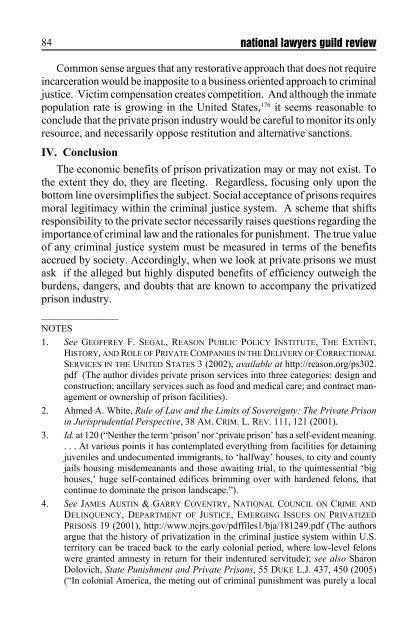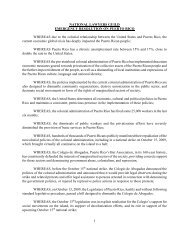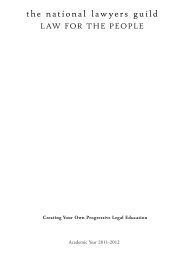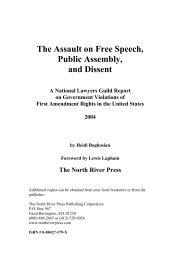Does your library have National Lawyers Guild Review?
Does your library have National Lawyers Guild Review?
Does your library have National Lawyers Guild Review?
You also want an ePaper? Increase the reach of your titles
YUMPU automatically turns print PDFs into web optimized ePapers that Google loves.
84 national lawyers guild reviewCommon sense argues that any restorative approach that does not requireincarceration would be inapposite to a business oriented approach to criminaljustice. Victim compensation creates competition. And although the inmatepopulation rate is growing in the United States, 176 it seems reasonable toconclude that the private prison industry would be careful to monitor its onlyresource, and necessarily oppose restitution and alternative sanctions.IV. ConclusionThe economic benefits of prison privatization may or may not exist. Tothe extent they do, they are fleeting. Regardless, focusing only upon thebottom line oversimplifies the subject. Social acceptance of prisons requiresmoral legitimacy within the criminal justice system. A scheme that shiftsresponsibility to the private sector necessarily raises questions regarding theimportance of criminal law and the rationales for punishment. The true valueof any criminal justice system must be measured in terms of the benefitsaccrued by society. Accordingly, when we look at private prisons we mustask if the alleged but highly disputed benefits of efficiency outweigh theburdens, dangers, and doubts that are known to accompany the privatizedprison industry.________________NOTES1. See Geoffrey F. Segal, Reason Public Policy Institute, The Extent,History, and Role of Private Companies in the Delivery of CorrectionalServices in the United States 3 (2002), available at http://reason.org/ps302.pdf (The author divides private prison services into three categories: design andconstruction; ancillary services such as food and medical care; and contract managementor ownership of prison facilities).2. Ahmed A. White, Rule of Law and the Limits of Sovereignty: The Private Prisonin Jurisprudential Perspective, 38 Am. Crim. L. Rev. 111, 121 (2001).3. Id. at 120 (“Neither the term ‘prison’ nor ‘private prison’ has a self-evident meaning.. . . At various points it has contemplated everything from facilities for detainingjuveniles and undocumented immigrants, to ‘halfway’ houses, to city and countyjails housing misdemeanants and those awaiting trial, to the quintessential ‘bighouses,’ huge self-contained edifices brimming over with hardened felons, thatcontinue to dominate the prison landscape.”).4. See James Austin & Garry Coventry, <strong>National</strong> Council on Crime andDelinquency, Department of Justice, Emerging Issues on PrivatizedPrisons 19 (2001), http://www.ncjrs.gov/pdffiles1/bja/181249.pdf (The authorsargue that the history of privatization in the criminal justice system within U.S.territory can be traced back to the early colonial period, where low-level felonswere granted amnesty in return for their indentured servitude); see also SharonDolovich, State Punishment and Private Prisons, 55 Duke L.J. 437, 450 (2005)(“In colonial America, the meting out of criminal punishment was purely a local












![NLGRev 68-2[1].indd - National Lawyers Guild](https://img.yumpu.com/30820772/1/167x260/nlgrev-68-21indd-national-lawyers-guild.jpg?quality=85)



